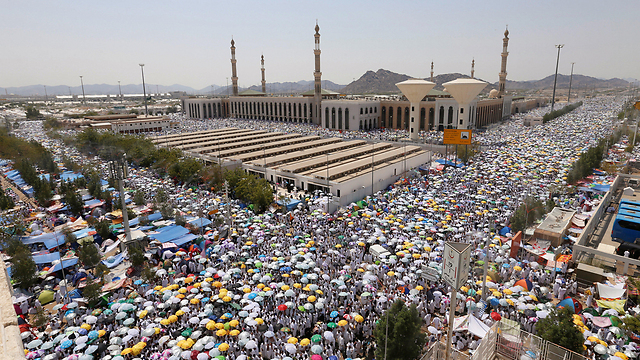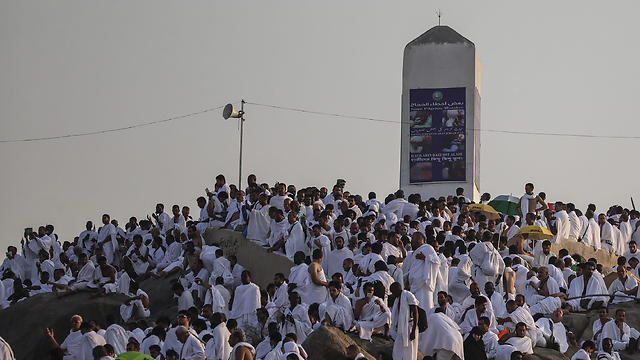Despite its being a religious commandment, the hajj is difficult to complete, both due to cost and to the extremely limited hajj visas required; many pilgrims find other ways to get to Saudi Arabia.
Some Muslims are apparently ready to go to any lengths to participate in the hajj, the annual pilgrimage to Mecca. Strict quotas and expensive travel have pushed some pilgrims to smuggle drugs, forge passports and paperwork, and, in some cases, enter Saudi Arabia illegally.
In August, 177 Indonesians were arrested after attempting to use fake Filipino passports to travel to Medina by means of a massive passport scam. It was also reported that another 500 to 700 Indonesians managed to enter Saudi Arabia using forged Philippine passports. A further 229 Indonesians were detained by the Saudis for not having proper permits. And, a Nigerian woman was found guilty of attempting to smuggle cocaine in order to pay for her hajj.
“The hajj is one of the five pillars of Islam, and every Muslim has to fulfill this duty once in his or her life,” Stephan Rosiny, a research fellow at the German Institute of Global and Area studies told The Media Line. “Saudi Arabia controls the hajj because it takes place in its territory, and the Saudi king calls himself the protector of the two holy sites, Mecca and Medina.”

While this journey is only required for all able-bodied and financially stable Muslims, it is not only expensive, but nearly impossible to perform unless a pilgrim goes through a travel agency. Travelers to the kingdom are required to apply for special hajj visas, and each country has a quota of pilgrims it may send. “You have something like 1.5 billion Muslims nowadays and you cannot allow all Muslims to take part each year. Each country has a fixed quota of people who can come every year,” Rosiny said. “It is a major source of income for Saudi Arabia. The pilgrimage and hajj have always been connected to business.”
The quotas limit the number of Muslims allowed to enter Saudi Arabia because the country does not have the infrastructure or resources to support the massive amount of people who wish to perform the hajj. Not having proper documentation to travel to Mecca can result in imprisonment and exile.
With approximately 250 million Muslims, Indonesia has the largest population of Islamic devotees in the world, comprising over 12 percent of the world’s Muslims. However, the Saudi government has capped their quota at 168,000. The Indonesian waiting list to go to Mecca for the hajj is 15 years.
Historically, Saudi Arabia and Indonesia have a fraught relationship due to competing views on Islam. “It’s a complicated relationship in terms of how they each view their own hierarchy. Saudi Arabia does not think Indonesia is very high in terms of other Muslim countries, and Indonesia has a self-consciousness about that,” Aaron Connelly, research fellow at the Sydney-based Lowy Institute for International Policy explained. “The important thing about the relationship with Saudi Arabia is that many Saudis don’t really consider most Indonesians to be good Muslims.”

Many Saudis also see Indonesians as domestic workers, which contributes to the contentious relationship, Connelly added.
While many of the pilgrims go through third-party syndicates to help them get to Saudi Arabia, others resort to illegal activities.
Binuyo Basari Iyabo, a 55-year-old mother of three, was arrested at the international airport in Abuja, Nigeria by the National Drug Law Enforcement Agency for smuggling cocaine. Iyabo, who excreted some 82 cocaine pellets, was taken into custody while trying to board an Emirates flight on her way to Saudi Arabia as a hajj pilgrim.
According to Vanguard, a Nigerian newspaper, Iyabo admitted to trafficking the narcotics to help cover her trip to Saudi Arabia. “I wanted to expand my cosmetic business, but I have no money. My sponsor offered to foot my expenses to Saudi on pilgrimage. This was how I got involved in the act. I was excited until the issue of drugs was introduced,” Iyabo said in an interrogation.
Not only is the pilgrimage expensive, but it can be dangerous as well. Last year, there was a stampede that killed some 2,236 pilgrims.
“Mecca gets really, really crowded,” Shahed Khaled, a Saudi medical student said. “People die yearly because of that. It is, however, very organized if you stay calm and follow the rules.”
As reported by Ynetnews
